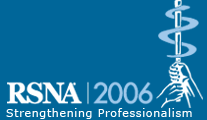
Abstract Archives of the RSNA, 2006
LL-HS4368-L03
Frequency of Referral of Patients with Safety-related Contraindications to Magnetic Resonance Imaging
Scientific Posters
Presented on November 29, 2006
Presented as part of LLHS-L: Health Services, Policy, and Research
Marc Dewey MD, Presenter: Research grant, General Electric Company (Amersham plc)
Research grant, Bracco ALTANA Pharma GmbH
Research grant, Toshiba Corporation
Speakers Bureau, Toshiba Corporation
Tania Schink MS, Abstract Co-Author: Nothing to Disclose
Charles Frank Dewey MD, Abstract Co-Author: Nothing to Disclose
Shrapnels, cardiac pacemakers, and other metallic ferromagnetic implants (such as insulin pumps, cochlear implants) are contraindications to undergoing magnetic resonance (MR) examinations. We sought to investigate the frequency of absolute and relative contraindications to MR.
We analyzed the frequency of patients with absolute and relative contraindications to MR imaging who were actually referred to an outpatient imaging center for an MR examination between November 3, 1997 and December 23, 2005. A total of 56061 consecutive patients were included in this study.
The referral frequency of patients with absolute contraindications to MR imaging was 0.39% (216 of 56061 patients; 95% confidence interval [CI], 0.34-0.44%). The reasons for absolute contraindications were shrapnels (123 patients, 0.22%; 95% CI, 0.18-0.26%), cardiac pacemakers (46 patients, 0.08%; 95% CI, 0.06-0.11%), and other metallic ferromagnetic implants (47 patients, 0.08%; 95% CI, 0.06-0.11%). Also patients with a relative contraindication to MR imaging were referred such as women with a first-trimester pregnancy (14 patients, 0.02%; 95% CI, 0.01-0.04%) and severely obese patients (51 patients, 0.09%; 95% CI, 0.07-0.12%).
Surprisingly a considerable number of patients (0.39%) with cardiac pacemakers, other ferromagnetic metallic implants (not approved for MR), or shrapnels were referred to the MR facility despite the well-known recommendations not to examine such patients. Thus, every effort needs to be made to screen patients prior to MR imaging for such contraindications to avoid detrimental results.
Absolute contraindications to MR imaging are commonly found among patients referred to MR examinations.
Dewey, M,
Schink, T,
Dewey, C,
Frequency of Referral of Patients with Safety-related Contraindications to Magnetic Resonance Imaging. Radiological Society of North America 2006 Scientific Assembly and Annual Meeting, November 26 - December 1, 2006 ,Chicago IL.
http://archive.rsna.org/2006/4436159.html
Accessed November 10, 2025

